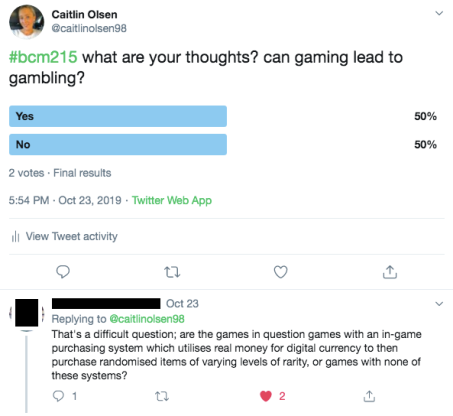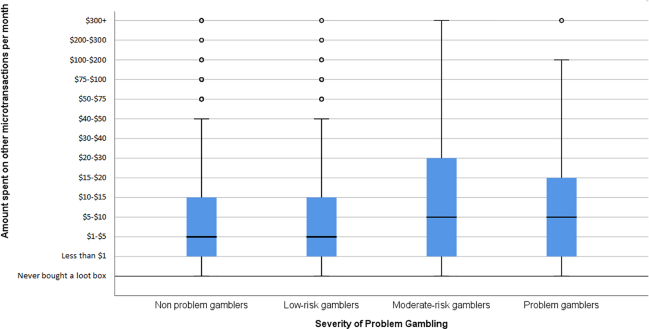For the second segment of my digital artefact I will be looking distinctly at the relationship between gaming and gambling. Two words that sound very similar, have few consistent attributes and may even be used as interchangeable terms.
The term ‘video game’ refers broadly to an interactive playable form of digital entertainment (Esposito, 2005). Gambling is primarily guided by legislation which varies across jurisdictions. There tends to be three basic components of gambling:
- “The consideration” or the act of staking something of value, usually a monetary sum.
- Upon the outcome of a contest of chance or a future contingent event not under the person’s control or influence.
- With an agreement or understanding that the person or someone else will receive a monetary sum or something of value in the event of a certain outcome.
These three components may be summarised concisely as the consideration, chance and prize.
Gaming may not carry a negative connotation and you don’t have to leave the comfort of your own home and sit in a casino chair to participate. However with the emergence of different fantasy games or RPG’s like Final Fantasy, World of Warcraft and the Legend of Zelda where you can successfully spend real money to buy loot boxes with random rewards that enhance your gameplay abilities, the fine line between video games and gambling games becomes even finer. Weapon upgrades, level up’s, new players or characters seem harmless to most people but it just may be the consumable virtual item that is quickly leading to a more plausible affiliation. The future could mean a legislation banning the sale of loot boxes in games targeted at children under 18 years. It was only May of this year that United States Senator Josh Hawley announced he would be introducing a bill banning ‘manipulative’ design features in video games with underage audiences, including the sale of loot boxes (Kelly, M 2019).
“Social media and video games prey on user addiction, siphoning our kids’ attention from the real world and extracting profits from fostering compulsive habits…” – Senator Josh Hawley
One particular case in December 2017 shows the tangible financial loss that RPG games with loot boxes can induce. This man hadn’t lost his money betting on football or feeding notes into a machine terminal, he had been playing the mobile video game, Final Fantasy: Brave Exodus, a free game. Though the game left him with a horrific credit card debt of $16,000. A painful narrative that doesn’t seem possible until it actually happens.
Gaming and gambling have been increasingly recognised as sharing many common features at a structural and aesthetic level (King, D 2015). Technological capabilities have allowed for gaming and gambling activities and industries to change constantly.
A recent Morgan Stanley Research report (2012) stated there are five primary types of convergence between gambling and gaming:
- The introduction of gambling elements to games on social media
- The cross-selling and marketing of online gambling sites or land-based venues to social gaming customers.
- The introduction of social gaming features to online gambling sites
- The consolidation of similar games on non-monetary social gaming and online gambling sites owned by the same operator
- The ‘gamblification’ of non-gambling games, in which customers can win items of value
These types of convergence suggest that there is always new products reaching the market, allowing for a range of different activities which therefore have an affect on the vulnerabilities of individuals and may further lead to problematic habits of play.
So, with gambling-related harm having the influence to affect multiple domains of life, including financial and health problems, psychological and emotional distress, and impaired social and cultural relationships (Latvala, T 2019). Much like games which have the potential to strain relationships, affect health such as the brain, vision, memory and may even lead to fatigue, stress and anxiety. However as I conducted my own research I found that many people whom participated in a question mostly agreed that it was a matter of time management whilst playing games that kept the activity safe and harmless. Although in terms of the correlation between gaming and gambling people suggested that there wasn’t one. More so that features such as RNG and rewards which were represented in fun, bright colours were the ultimate issue.

Digital convergence is primarily why people make links between gaming and gambling. Gambling products are increasingly incorporating gaming themes and elements and vice versa. The evolution of gaming in some cases is altering to imitate gambling, with the rise of social casino games. Furthermore a newly emergent phenomenon places direct connection between eSports and gambling.
As written in Joseph Macey’s journal, a study conducted found that “contemporary video games are not in themselves, associated with increased potential for problematic gambling, indeed, the position that problem gambling and problem gaming are fundamentally connected is questioned” (Macey, J 2018).
The emergence of loot boxes may be the essential, dominating factor that has allowed for research to be conducted into the correlation between gaming and gambling in the first place. For example, the infamous Fortnite allows players to spend real mine on loot boxes with no guarantee or assurance of quality return, if any. This lead to several ethical questions evolving, surrounding the idea of loot boxes. Many detractors saying that the practice of employing them is allowing developers to take advantage of gamers (Forrest, S 2019).

But it is not just the comparability allowing for discussion. There has also been widespread conversation and research into the identification of critical points of difference in digital forms of gambling and gaming. Both activities may provide rewards delivered on a random of fixed interval basis, employ similar on screen visual cues, provide social space for interaction and competition and offer opportunity for advancement and progression. Though despite these commonalities in features of design there are a number of practical problems both in terms of public understanding and the ways in which societies respond to technology-based addictions (King, D 2015).
In summary, there are multiple areas of gaming-gambling crossover that are being monitored closely by gambling commissions and other stakeholders. In the meantime, further research is needed to describe the rates of youth participation in these activities and their potential impact in relation to gambling-related harms and other mental health-related consequences (King, D 2018).
Thanks for reading the second segment of my digital artefact. Tune in for another wordpress post accommodated by a podcast in the final piece.
Update* On October 31 2019- Taken from European Gaming by Narayan Niji
Swedish Consumer Agency Konsumentverket has submitted a report that warned of the video game feature’s potential risks for children and the vulnerable to the country’s Gaming Market Commission Spelmarknadsutredningen. The report compiles a series of recommendations for reducing the negative effects of gambling in the country.
While it said the mechanic of buying an item without knowing what it was did not constitute gambling, it noted that if that item could then be exchanged for cash, this could fall under the remit of the Gaming Act.
“The fact that computer and video games are of great interest to children and young people makes the issue extra important,” Shekarabi said.
References:
Forrest, S 2019, Whats the difference between gaming and gambling?, Venture beat, https://venturebeat.com/2019/10/06/whats-the-difference-between-gaming-and-gambling/
Hern, A 2017, Video games are unlocking child gambling, The Guardian, https://www.theguardian.com/commentisfree/2017/dec/28/video-games-unlock-child-gambling-loot-box-addiction
Kelly, M 2019, Game studios would be banned from selling loot boxes to minors under new bill, The verge, https://www.theverge.com/2019/5/8/18536806/game-studios-banned-loot-boxes-minors-bill-hawley-josh-blizzard-ea
King, D 2018, Online gaming and gambling in children and adolescents – Normalising gambling in cyber places, Victorian Responsible Gambling Foundation, Melbourne.
King, D et al 2015, Distinguishing between gaming and gambling activities in addiction research, Journal of Behavioural Addictions vol. 4, https://www.ncbi.nlm.nih.gov/pmc/articles/PMC4712754/
Latvala, T et al 2019, Public health effects of gambling- debate on a conceptual model, BMC Public Health, https://bmcpublichealth.biomedcentral.com/articles/10.1186/s12889-019-7391-z
Trevorrow, K et al 1998, The Association between loneliness, social isolation and women’s electronic gaming machine gambling, Journal of Gambling studies vol. 14, Issue 3, https://link.springer.com/article/10.1023/A:1022057609568
Zendle D, Cairns P 2018, Video game loot boxes are linked to problem gambling: Results of a large-scale survey, https://doi.org/10.1371/journal. pone.0206767




